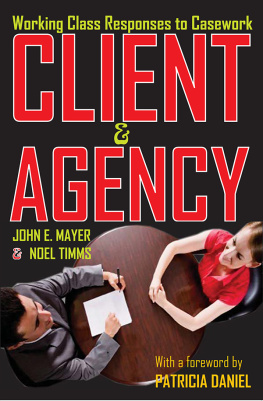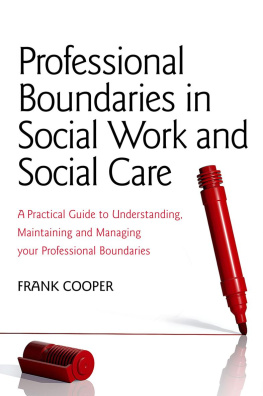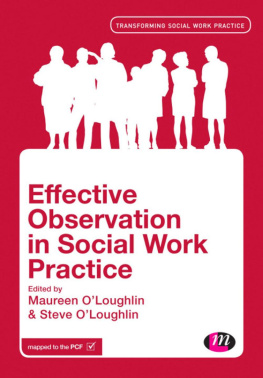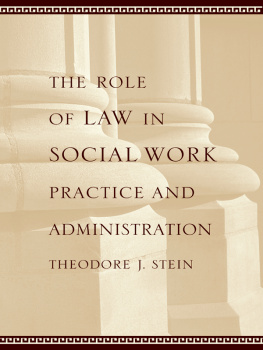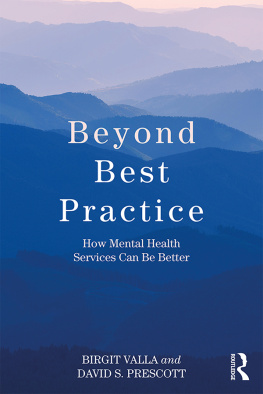CLIENT
&
AGENCY
Working Class Responses to Casework
CLIENT
&
AGENCY
JOHN E. MAYER
& NOEL TIMMS
With a foreword by
PATRICIA DANIEL
First published 1970 by Transaction Publishers
Published 2017 by Routledge
2 Park Square, Milton Park, Abingdon, Oxon 0X14 4RN
711 Third Avenue, New York, NY 10017, USA
Routledge is an imprint of the Taylor & Francis Group, an informa business
Copyright 1970 by Taylor & Francis.
All rights reserved. No part of this book may be reprinted or reproduced or utilised in any form or by any electronic, mechanical, or other means, now known or hereafter invented, including photocopying and recording, or in any information storage or retrieval system, without permission in writing from the publishers.
Notice:
Product or corporate names may be trademarks or registered trademarks, and are used only for identification and explanation without intent to infringe.
Library of Congress Catalog Number: 2009025738
Library of Congress Cataloging-in-Publication Data
Mayer, John E., 1921
Client and agency : working class responses to casework / John E. Mayer and Noel Timms ; with a foreword by Patricia Daniel,
p. cm.
Originally published: London : routledge & K. Paul, 1970.
Includes bibliographical references and index.
ISBN 978-0-202-36342-4
1. Social case work. 2. Working classAttitudes. I. Timms, Noel. II. Title.
HV43.M37 2009
361.32dc22
2009025738
ISBN 13: 978-0-202-36342-4 (pbk)
The confusion between the interest which a person himself has or takes, and the interest which a second person has or takes in him, is one of the pitfalls of parentage, teaching, religion, and all the varied forms of professed benevolence. In order to discover whether professed benevolence is really independent benevolence, ask the beneficiary rather than the benefactor
R. B. Perry
Realms of Value
Contents
Foreword
Patricia Daniel, formerly Casework Consultant, Family Welfare Association
The Family Welfare Association is pleased to be associated with the publication of this study of the views of sixty-one clients about the service they received from the Associations social work staff during the first part of 1967.
The reasons for co-operating in an enquiry of this kind were threefold. First, since people are relatively free to choose to use FWAs casework service it was thought that it would be useful to know more about the circumstances and motivation which brought them to the Association rather than to any of the many other social work services in inner London. Secondly, at the time when the study was first proposed at the beginning of 1967 it was already clear that there would be a considerable development of family services in the local authority sphere and the Association would therefore need to reconsider the future of its own family casework service. It was hoped that the study might indicate the gaps it was filling or failing to fill. Thirdly, it was thought that client opinion would be immediately relevant to the staff of FWA and probably to other social workers and teachers of social work as well.
Sixty-five clients were invited to participate in the study through a letter written by the head of the Social Work Department, and only four refused. The problems which had been most frequently focused upon by FWA social workers in their treatment were marital and economic difficulties, and these two problems were also the ones most frequently concentrated upon in the agencys total caseload during the same five-month periodJanuary to May 1967but the study clients had a higher proportion of marital problems, 34 per cent vs. 19 per cent. The study sample was a predominately working class group in that four out of five of the respondents left school at fifteen or younger and only one had gone to university; also in three out of four cases the head of the household was a manual worker.
There has been a growing awareness of the importance of consumer opinion in the social services following the widespread impact of consumer groups, particularly those concerned with educational and medical services. Social work agencies have hesitated, uncertain about the researchers and their methods, and fearful of the outcome because this kind of research involves examination of the activities of social workers as perceived by their clients and this is threatening. Social workers must feel professionally secure and supported in their practice if they are to tolerate this sort of independent examination. But it is desirable that they do so because client opinion is one way of checking the effectiveness of their work. Appropriate handling of staff involvement and reactions to research in social work organizations is crucial if practitioners are subsequently to make an intelligent critical appraisal of the findings. It is also important that the agency should have confidence in the professionalism and integrity of those conducting the research. In this study the fact that both Professor Timms and Dr Mayer were already known and trusted by a number of senior staff was an important factor in the decision to give them access to clients and in the Family Welfare Association co-operating in their project.
The practice of social work requires the application of knowledge derived from a variety of sources and academic disciplines. It is frequently difficult to relate conflicting evidence and diverse theories about human behaviour for use in day-to-day work with acutely troubled and deprived people. But the opinion of clients about what they think we door fail to dowith, to, or for them must surely be of significance and the importance of this preliminary study lies in the fact that it demonstrates the wealth of material which can be obtained from clients themselves, and that they can be approached with suitable safeguards. It points to the need for more extensive studies of both consumers and suppliers of social work services because it raises many pertinent questions.
Patricia Daniel
Acknowledgements
This book is the result of our collaboration which began in London and continued across the Atlantic. It represents also the fusion of two perspectivessociological (J.M.) and social work (N.T.). We have found it a fruitful venture in co-operation, and we believe it is the kind of collaboration that holds promise for the future. However, our present debt to others is considerable.
The research on which this book is based was supported by a grant from the Johnson Fund of the American Philosophical Society. We are indebted to Patricia Daniel, formerly director of the casework services of the Family Welfare Association, London, for her interest in research and for creating a climate of opinion that enabled this project to be undertaken in the agency. We are grateful to the clients who appear in this book under fictitious names and to the social workers who gave us so much of their time. Malcolm Ford, formerly of the FWA, helped to launch the study, and Gill Brown and Mary Twyman undertook most of the interviewing. Miss E. M. Deuchar helped us by making initial contacts with many of the clients and arranging the subsequent research interview. Miss Doris Jones efficiently transcribed many of our tapes.
We are especially grateful to Dr Israel Zwerling, Director of Bronx State Hospital, for enabling one of the authors (J.M.) to take time from other duties whilst the study was being completed. Dr Zwerling has created a unique research environment at the hospital-one in which investigators are encouraged to pursue studies which have relevance not just for the hospital population, but for the mental health field as a whole.

